

Pixar22RulesAnalyzed_Bugaj. The Utopia at the End of the World. The robots revolt and kill us all.
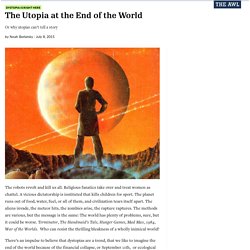
Religious fanatics take over and treat women as chattel. A vicious dictatorship is instituted that kills children for sport. The planet runs out of food, water, fuel, or all of them, and civilization tears itself apart. The aliens invade, the meteor hits, the zombies arise, the rapture raptures. The methods are various, but the message is the same: The world has plenty of problems, sure, but it could be worse. McLuhanisms – MMXI – Marshall McLuhan. Philip K Dick. How to Live: Lessons from Montaigne, Godfather of Blogging. By Maria Popova Don’t worry about death, pay attention, read a lot, give up control, embrace imperfection.
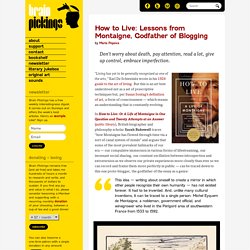
“Living has yet to be generally recognized as one of the arts,” Karl De Schweinitz wrote in his 1924 guide to the art of living. But this is an art best understood not as a set of prescriptive techniques but, per Susan Sontag’s definition of art, a form of consciousness — which means an understanding that is constantly evolving. This idea — writing about oneself to create a mirror in which other people recognize their own humanity — has not existed forever. An Answer to the Novel’s Detractors. Less than a hundred years ago, D.H.

Lawrence called the novel “the highest form of human expression so far attained.” Jane Austen said that it had nothing to recommend it but “genius, wit and taste.” A Memoir Is Not a Status Update. In the middle of my writing day, I sometimes take a Facebook break.
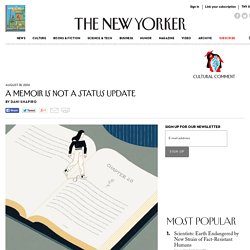
I know I shouldn’t do this. I counsel my writing students not to do this. But writing is a solitary business, and—well, let’s face it, Facebook is tempting. It’s right there. A lonely writer can be connected with a whole range of humanity without ever leaving her desk chair. Karl Ove Knausgaard: ‘Writing is a way of getting rid of shame’ Newyorker. My Chinese censor is Zhang Jiren, an editor at the Shanghai Translation Publishing House, and last September he accompanied me on a publicity tour.
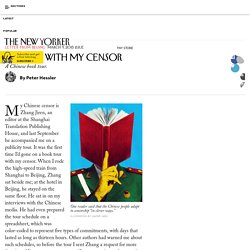
It was the first time I’d gone on a book tour with my censor. When I rode the high-speed train from Shanghai to Beijing, Zhang sat beside me; at the hotel in Beijing, he stayed on the same floor. The 100 best novels: No 76 – On the Road by Jack Kerouac (1957) In 1855, a young American poet named Walt Whitman announced, with typical gusto, that “the United States themselves are essentially the greatest poem”, and made good on this claim in a landmark collection of poems, Leaves of Grass, transforming America’s literary imagination for ever.

Leo Johnson: making wine turned our street into a community. The Hunger Games, explained. The beginning of the end of the Hunger Games movie franchise arrives today.
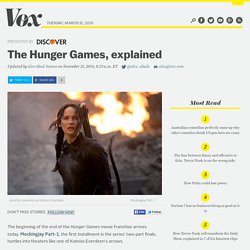
Mockingjay Part-1, the first installment in the series' two-part finale, hurtles into theaters like one of Katniss Everdeen's arrows. It's been six years since readers — and then viewers — were first introduced to the "Girl on Fire," and in that time, Katniss and the franchise have become household names. But maybe you're just getting into The Hunger Games. That's cool — and you have some awesome books and movies to catch up with. Here are some questions you might have. 1) What are The Hunger Games books and movies? The Hunger Games is a trilogy of young adult, dystopian novels written by Suzanne Collins, a woman previously known for writing for Nickelodeon's early '90s sitcom Clarissa Explains It All.
Collins's books have been immensely popular — in 2012 Scholastic announced that 50 million copies of the books had been sold — and are now movies. 30 Amazing Stanley Kubrick Cinemagraphs. The Lobby is a multiverse of random things we found on the interwebs, along with the occasional 3AM drunken rants by our founders and their minions.

These posts are curated by our highly trained group of crazy, up-jumped, Scarlett Johansson-obsessed, hard-drinking monkeys on a vision quest in a sacred North Dakota sweat lodge at the invitation of our great native elder, Chief Running Nose. The Lobby is currently the world’s largest repository of dead YouTube links and contains quite possibly the best tasting nacho cheese dip in existence. All In this relatively brief 4,000 word video essay John lobs a metaphorical bomb into the cottage industry of “Exposure Triangle” Videos. Kurt Vonnegut’s 8 Tips on How to Write a Great Story. By Maria Popova The year of reading more and writing better is well underway with writing advice the likes of David Ogilvy’s 10 no-bullshit tips, Henry Miller’s 11 commandments, Jack Kerouac’s 30 beliefs and techniques, John Steinbeck’s 6 pointers, and various invaluable insight from other great writers.
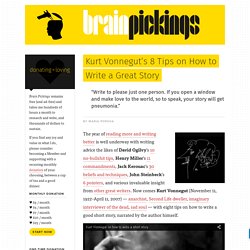
Now comes Kurt Vonnegut (November 11, 1922–April 11, 2007) — anarchist, Second Life dweller, imaginary interviewer of the dead, sad soul — with eight tips on how to write a good short story, narrated by the author himself. Jean-Luc Godard. Jean-Luc Godard (French: [ʒɑ̃lyk ɡɔdaʁ]; born 3 December 1930) is a French-Swiss film director, screenwriter and film critic.
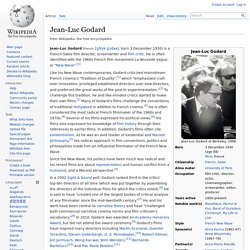
He is often identified with the 1960s French film movement La Nouvelle Vague, or "New Wave". Like his New Wave contemporaries, Godard criticized mainstream French cinema's "Tradition of Quality", which "emphasized craft over innovation, privileged established directors over new directors, and preferred the great works of the past to experimentation. " To challenge this tradition, he and like-minded critics started to make their own films. Many of Godard's films challenge the conventions of traditional Hollywood in addition to French cinema.[3] He is often considered the most radical French filmmaker of the 1960s and 1970s. Wim Wenders. Alongside filmmaking, Wenders works with the medium of photography, emphasizing images of desolate landscapes.[1][2] Early life[edit] Wenders was born in Düsseldorf into a traditional Catholic family.
Quentin Tarantino. Early life[edit] Tarantino was born in Knoxville, Tennessee in 1963.[6] He is the son of actor and amateur musician Tony Tarantino and nurse Connie McHugh.[7][8] He has a younger half-brother named Ron. Tarantino grew bored with the James Best Acting School and left after two years, although he kept in touch with all of his acting friends. He then landed a job which threatened to interfere with his long-term acting ambitions.[17] As an employee of Video Archives, a now-defunct video rental store in Manhattan Beach, he and fellow movie enthusiasts (including Roger Avary) discussed cinema and customer video recommendations at length. He paid close attention to the types of films people liked to rent and has cited that experience as inspiration for his directorial career.[18] Tarantino has been quoted as saying: "When people ask me if I went to film school I tell them 'no, I went to films.